Remote work is becoming more common and more popular, as an increasing number of people want to have a flexible working schedule.
There is no better time than now to find a remote job and to work from home.
There are plenty of roles that can be done remotely, especially in the technology sector.
From product design and product management, to graphic design, marketing, sales and web development – web development jobs are one of the most popular and highly sought after roles.
In this article you'll see some of the ways you can find a remote developer role, when you're still early in your career.
We'll first go over how this shift towards remote work has occured in the last few years, as well as some of the pros and cons of working remotely.
Then, we'll see some strategies to help you land a remote developer role and some ways to stand out to future employers.
If you only want to just see some of the most popular remote job boards, skip to this part.
The Shift Towards Remote Work
The Covid-19 pandemic took the world by surprise in the beginning of 2020.
As everything started to shut down, a lot of workers were required and encouraged to work from home, making many companies remote overnight.
It's safe to say that the pandemic completely changed working life. What initially was a forced pivot is turning out to be a new world and a new way of working which is likely here to stay.
People's relationship with work has started to change. The view on fixed work spaces and workers needing to gather under the same office roof – something that has been considered the norm since the Industrial Revolution – has started to change.
With electronic means of communication such as e-mail and chat services widely available, along with communication platforms and shared documents, there doesn't seem to be an urgent need for many types of workers to be in the same building anymore.
Many people are now also reconsidering the idea of clocking in and out of work at set, fixed days and hours and becoming more aware of their time and what matters the most to them. After all, some may be more productive during the weekends and get more done on those days, instead of solely during a strict Monday to Friday and 9 - 5 schedule.
The Pros and Cons of Remote Work
The Pros and Cons of remote work are relative to every individual.
But in general, some pros of working remote that benefit both the companies and the people working at the companies, are the following:
- Flexible working schedules and locations typically increase productivity and performance.
- The above point leads to employees having more autonomy and independence which in turn leads to a happier workforce. Employees that feel trusted by their employers and have that level of freedom are more content with their jobs, efficient with their time, and more motivated to get their work done.
- Remote work allows you to travel and work from any part of the globe and become a digital nomad, making your own work schedule. When working in tech specifically, all you need is a good internet connection, a laptop, and good skills.
- With remote work you also place emphasis on producing quality work where you are highly focused on the task for a set amount of time that works for you. In a 9 - 5 job the bulk of the work for the day may be finished before 5 o'clock, but you'll still need to remain at the office and possibly not be as productive as you were during the remaining time.
- Office space is expensive, with companies paying thousands of dollars for office space every year per employee. Remote work would cut those costs, saving significant amounts of money.
- Remote work also means that long commutes to get into office everyday are no longer needed. Commuting often means spending a lot of time stuck in traffic, spending money on gas, or using crowded public transportation systems everyday. People can spend a lot of time can commuting - it's not uncommon for commuters to spend more than two hours each day getting to the office and going back home. This is often a cause of major stress. Not commuting to and from work can save a significant amount of time and money.
- With remote work, there is the opportunity to form distributed teams and hire people from all around the globe. This is more representative of the world as it is. Having people with diverse perspectives and backgrounds, with each having a wealth of different experiences to draw from, would in turn result in creating better products and services.
- With remote work you also get to spend more time with your family and loved ones.
- "With great freedom comes great responsibility" is a phrase that stands true when it comes to remote work. Often remote workers have a greater connection to the company's mission, which leads to greater motivation and sense of purpose. If you are not aligned with the company's values and don't find the work rewarding, it may be tempting to not put in the effort when there is no one watching you like there is in a 9 - 5 traditional office job.
There are also some potential cons of remote working:
- There are concerns around productivity. For example, a lack of a dedicated space and set up in your home where you can work comfortably and quietly could potentially lead to a decrease in productivity.
- A lack of a good Wifi connection, Internt speed, and decent voice quality could lead to troubles in communication. When a connection is not consistent and there are frequent disconnections, it makes communicating with team members difficult. Similarly, having poor voice quality, a microphone that doesn't work properly, or a lot of background noise can be distraction for others and make communicating over meetings harder.
- With remote work, some workers may be more prone than others to procrastination, getting easily distracted and managing their time efficiently. A good answer to that could be the Pomodoro Technique and time blocking tasks.
- Remote working may prove challenging for workers that have family members to frequently tend to and who need their attention.
- With remote work, work-life balance can be tricky at times. For this reason, some workers may enjoy the commute, the travelling to work and the removal from their home as they see it as a physical separation between work and social life. It can be a way to divide work from personal life and whatever issues are associated with that.
- Another potential issue is the difficulty in making connections and networking. This can be a challenge especially for juniors and folks that are early in their careers, and not so much for senior staff members who have developed their network over the years. Offices can be a good place for networking, but there are plenty of online communities available now, with new ones being created frequently, that can help you form connections in the industry.
- Differences in communication skills between team members can also be challenging. Communicating your thoughts in a clear and concice manner is sometimes tricky over email or a Zoom call. It can also be tough to break down problems, explain your thought process, and explain complex technical topics in simple words to technical and non-technical members of a team. And all this is necessary when working remotely. Remote work involves a lot of collaboration, so getting messages across clearly is vital, otherwise there will be frequent misunderstandings.
How to Appeal to Remote Companies as a Developer
Not all jobs can be done remotely.
It's no surprise that tech companies are paving the way and leading this shift towards remote work.
That being said, these tech roles are highly skilled - they are what are known as "knowledge jobs".
Most companies ask for a couple of years of experience, but how do you get that experience when you have none and no one will hire you because you lack that vital experience?
It's like a chicken and egg problem, and this can be even more of a problem when applying for a remote position.
How do you showcase your skills in an affective way when you are still early on in your career?
Companies want to know that you have the skills required and that you are capable of doing the job.
Not only that, but getting a remote role involves a lot more competition. The talent pool for selecting candidates is larger than ever, compared to what it typically is for traditional office jobs.
There are many people applying from all over the world just for one single position, since there are a lot of people wanting to work remotely and have that flexible schedule.
Listed below are some of the things you can do that may help you stand out in your remote job search as an early career developer.
There is the aspect of luck that plays role in every job search, but these points can help showcase your skills to prospective employers when you don't have that much experience.
Prep your GitHub Account for the Job
Include projects that you are proud of and are the most excited about.
Also, by showcasing projects that are related to the position you are applying to, you can discuss the different challenges you faced, the problems that arose, how you went about solving those problems and what you learned overall.
Make sure that your projects are well documented by creating README files for each one.
This way you can document your thought process and intentions while also showcasing your written communication skills which are important when working in tech.
Contribute to Open Source
Contributing to Open Source can be intimidating as a beginner, but it is worthwhile and does make a difference when applying to jobs. It's something that many employers appreciate.
You can start off by making small contributions. For example, you can correct grammar errors and typos and create sufficient documentation for projects that lack it.
This shows that you are able to communicate well and collaborate with other developers remotely and asynchronously to solve a problem. And all that is done in public.
A good place to start contributing is by checking out the freeCodeCamp repository for issues with the label "fist timers only".
Below are some resources to help you learn more about contributing to Open Source:
- The Ultimate Guide to Open Source
- The Definitive Guide to Contributing to Open Source
- How to Contribute to Open Source Projects – A Beginner's Guide
Create a Personal Website
A personal website is your own personal corner on the Internet and a way to show the world – including potential employers – who you are on a more personal level.
Include some information about yourself and the projects you are most proud of. Make sure all links are working and there are no typos.
The important information that employers are looking for needs to stand out clearly and easily at first sight.
Include an up to date CV/résumé and a way to contact you - preferably a professional e-mail address.
Below are some resources to help you with creating a portfolio website:
- Create a Portfolio Website Using HTML, CSS, JavaScript, and Bootstrap 5
- Build Your Own Developer Portfolio Website with HTML, CSS, and JavaScript
- Create a Portfolio Website – A Beginner Developer's Guide
Learn in Public
Learning in public and getting involved with the developer community can accelarate your career and help you make valuable connections.
It's a way to showcase that you have those communication skills that employers are looking for.
Whether it be blogging, writing about your coding journey, documenting what you are currently learning, or giving a talk at a local meetup, all help create your own sort of personal brand. People get an insight into who you are on a more personal level.
Including links of all the ways in which you are learning in public and engaging with the community shows a level of dedication and that you're serious about getting into tech.
You can share your findings, explain how you solved a specific problem in a blog post, or craft lists of helpful resources to share. These activities not only help you understand everything better, but will help others that are also learning.
Below are some resources to help you get started with technical writing:
- Writing Tips for Software Developers – How to Become a Better Tech Writer
- Technical Writing for Beginners – An A-Z Guide to Tech Blogging Basics
- How to Become a Technical Writer
Gain Experience Working Remotely
Having prior experience working remotely will likely increase your chances of getting another remote job, compared to someone who doesn't have that experience and know-how.
It shows that you are productive in remote settings.
Even if you are working in a different field and are not a remote worker, but want to transition into a remote tech role, you can negotiate a hybrid role at your current company. You might be able to work remotely 1 - 2 days a week, and the rest of the week to work from the office.
Gain Experience Working as a Developer
If you want to get a remote developer job as your first tech job, it may be more difficult than getting an traditional office job. Getting your foot in the door as a junior is hard enough, without the remote aspect.
Although this is in no way impossible to achieve, it may be more realistic to have a couple of years of experience under your belt. This can make the possibility of working remotely more likely.
It's easier for intermediate and senior level developers to land a remote role, compared to those searching for their first job in tech.
Onboarding a junior member on the team remotely and training them can prove to be challenging. This is especially true when you don't have much direct supervision and mentorship and they end up spending a lot of time alone.
Focus on learning the skills needed and building them to the point where you can market yourself well and stand out from the crowd. The more well-developed your skills are, the higher the chances.
Show Genuine Interest in the Remote Company you're Applying to
Taking the extra time and putting in that extra effort to craft a high-quality application will help you stand out. Make sure your application is tailored towards the company you're applying to and lay out what you have to offer and why you're the right fit.
Hiring managers can tell when you've copied and pasted your application to several other positions and when it's not tailored to that individual company.
So make sure you customize your application for the position and show that you've researched the company's website and/or blog to understand what they are doing and what their mission is. This will make a better impression and make you stand out more.
Where to Find Companies that Hire Remotely?
There are plenty of remote job boards where you can browse through hundreds of job postings and apply to any you see fit.
This section showcases some of the most popular job boards that advertise remote-friendly positions.
To see a complete list of remote-friendly companies, check out this comprehensive GitHub repository
Remote Ok
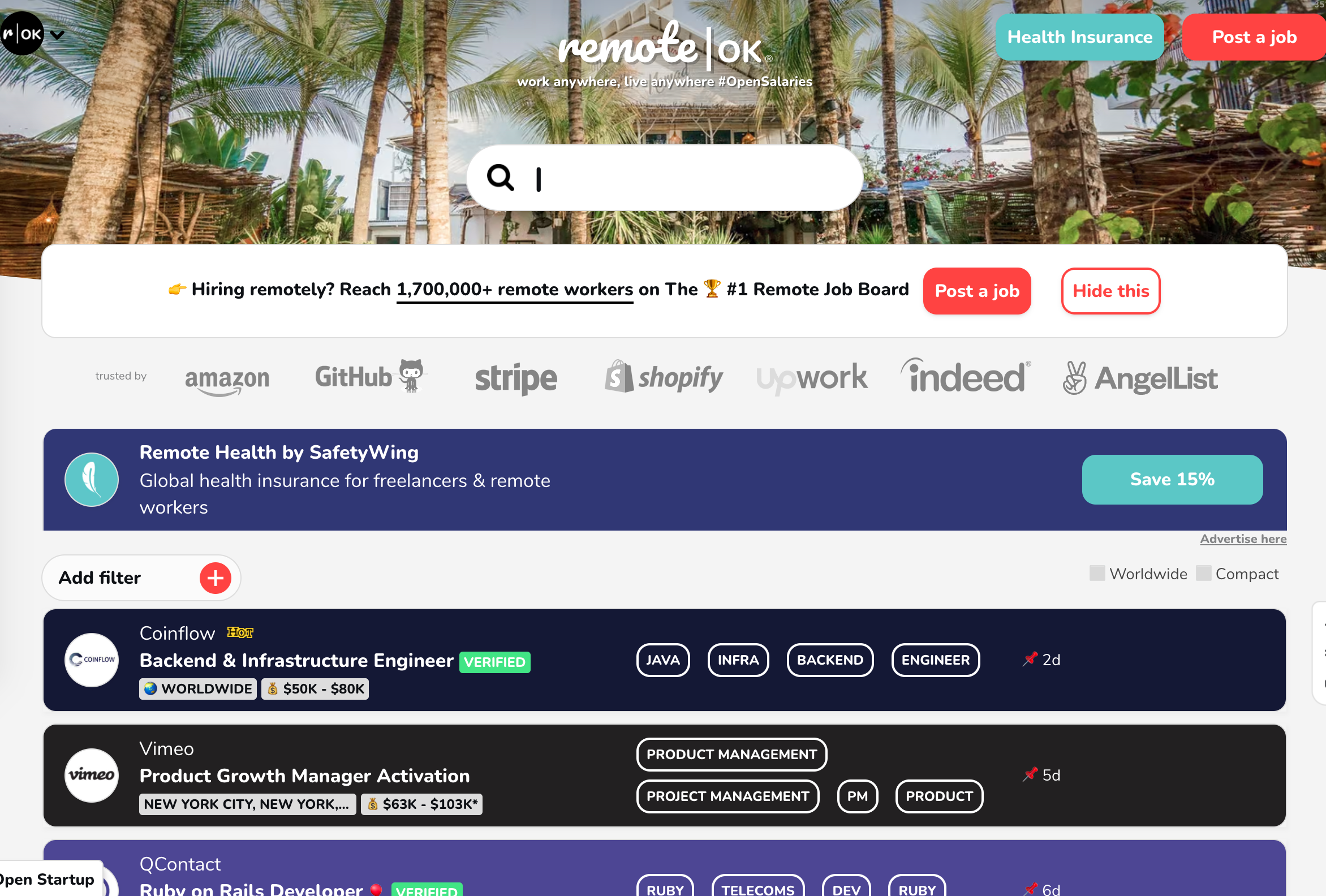
On Remote Ok you will find different kind of jobs listed, such as product designer, product manager, copywriter and copy editor, to name a few.
The majority of jobs, though, are software development jobs.
The website consists of hundreds of job postings and it's updated daily.
It's easy to use, without needing to sign-up anywhere or upload a CV in order to submit an application.
You can just click on the search bar at the top of the page. When you do so, you'll see a dropdown menu with a filter for the different job categories you can choose from and the number of jobs available in each category.
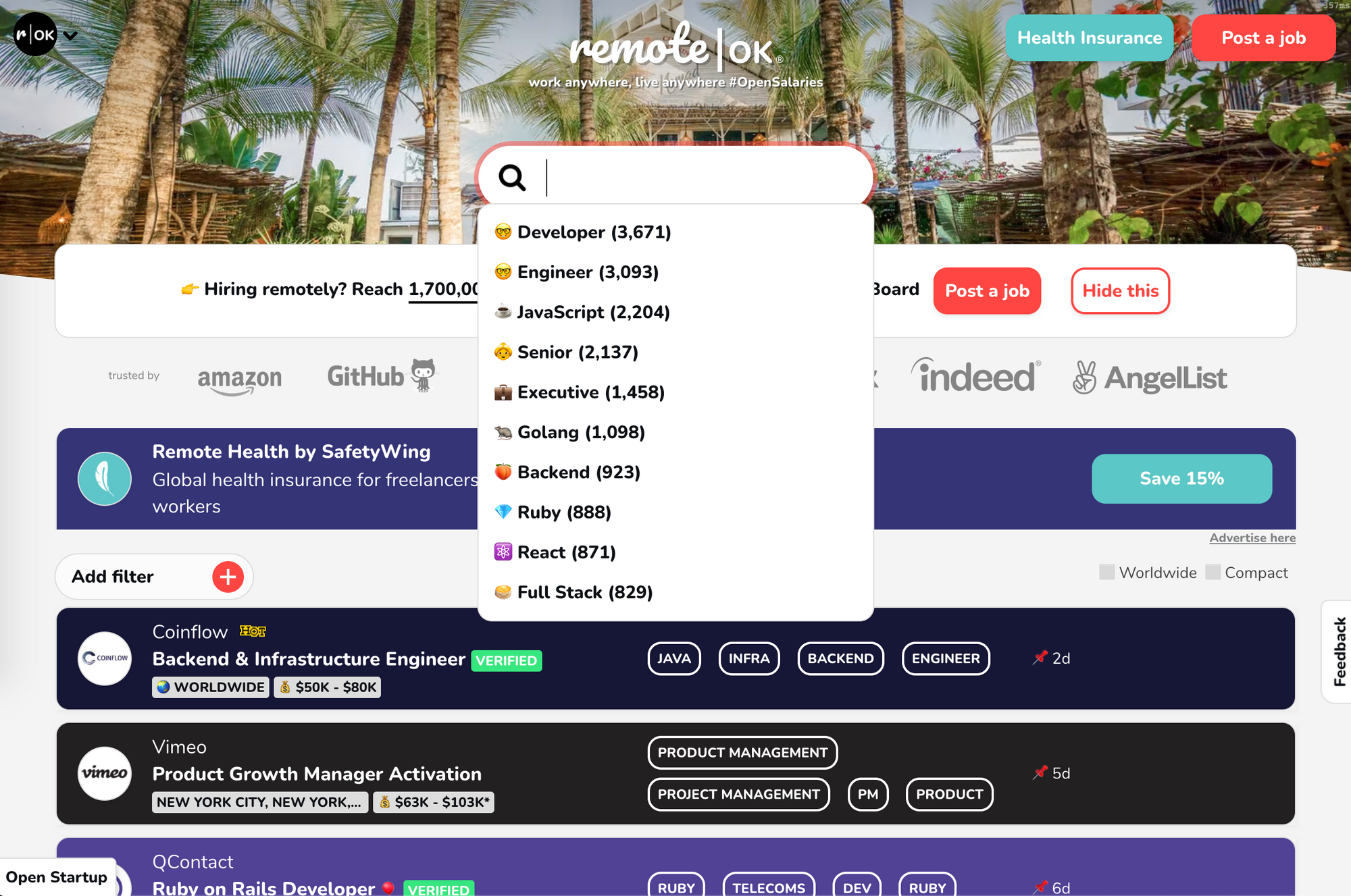
When you click on a link of a job posting, you'll see the full job description and then a button that says "Apply now".
When you click that button to apply for the job, you'll be redirected to the company's website.
This job board is more of a place to take a look at the different remote jobs that are available in the world. It's not meant for creating a profile of your own or submitting an application directly from the job board.
It's also one of the most impersonal job boards out there, since there is no information or a way to find out more about Remote Ok as a company, or a way to contact customer service.
Remote.co
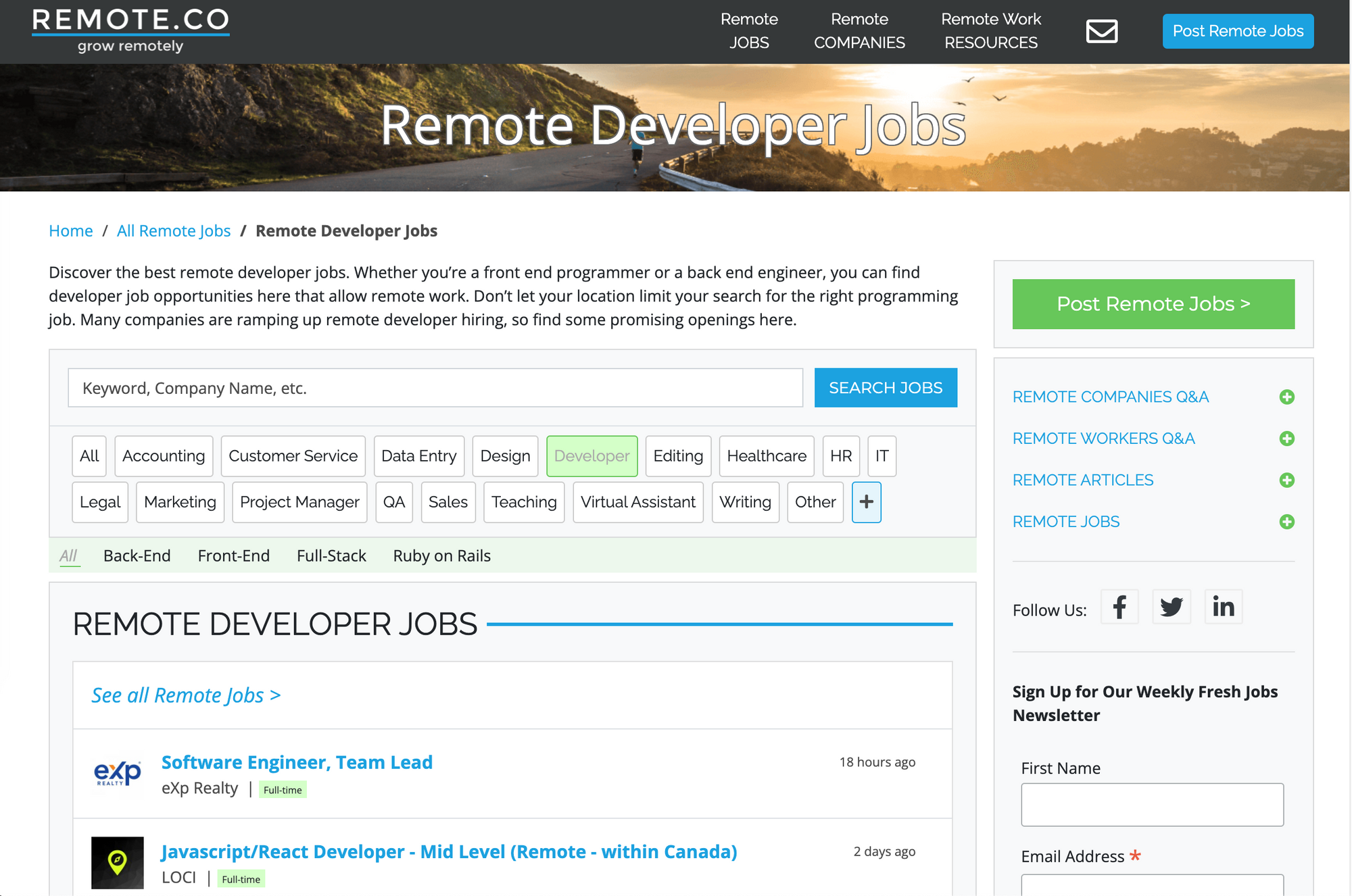
Remote.co is another remote job board with all kind of jobs listings available. There are editing jobs, customer service and marketing jobs, and many more.
There is also a wide selection of jobs in front-end development, back-end development, and full-stack development.
In the search bar at the top of the page, enter the type of position you're searching for or the name of a company you want to work at.
You can also sign up to their newsletter to receive daily job alerts, but other than that you don't need to sign up anywhere is order to view jobs or apply to jobs.
When you apply for a job, you'll be redirected to the company's website to apply directly from there.
This remote job is more personable compared to Remote Ok, since it has more information about it and different resources available.
There are articles on remote work, remote worker's rights, and even different online courses you can take.
We Work Remotely
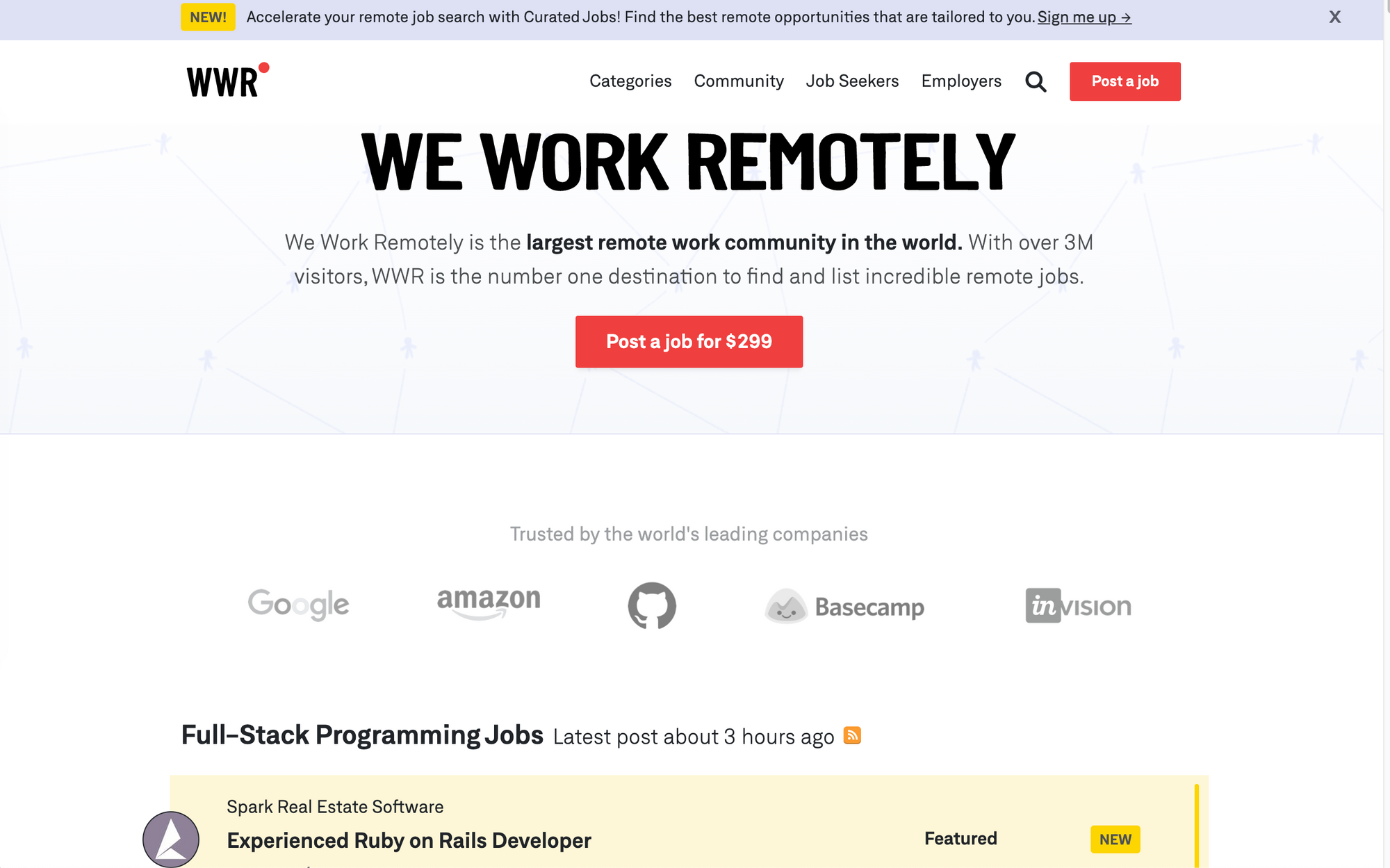
On We Work Remotely you'll find lists of jobs in sales, marketing, software development and more.
There are jobs available in front-end development, back-end development, full-stack development, and in DevOps and Systems administration.
You can create an account by providing your email address and setting a password. This way you'll be notified about new job openings and specifically jobs that are tailored to your area of interest.
The site also provides advanced search filters, where you enter the job title, the region where you want to work, and the time zone you're in, as well as the job type you're looking for. From there you can choose either contract work or full-time work.
When you apply for a position you will be redirected to the company's website you're applying to.
Remotive
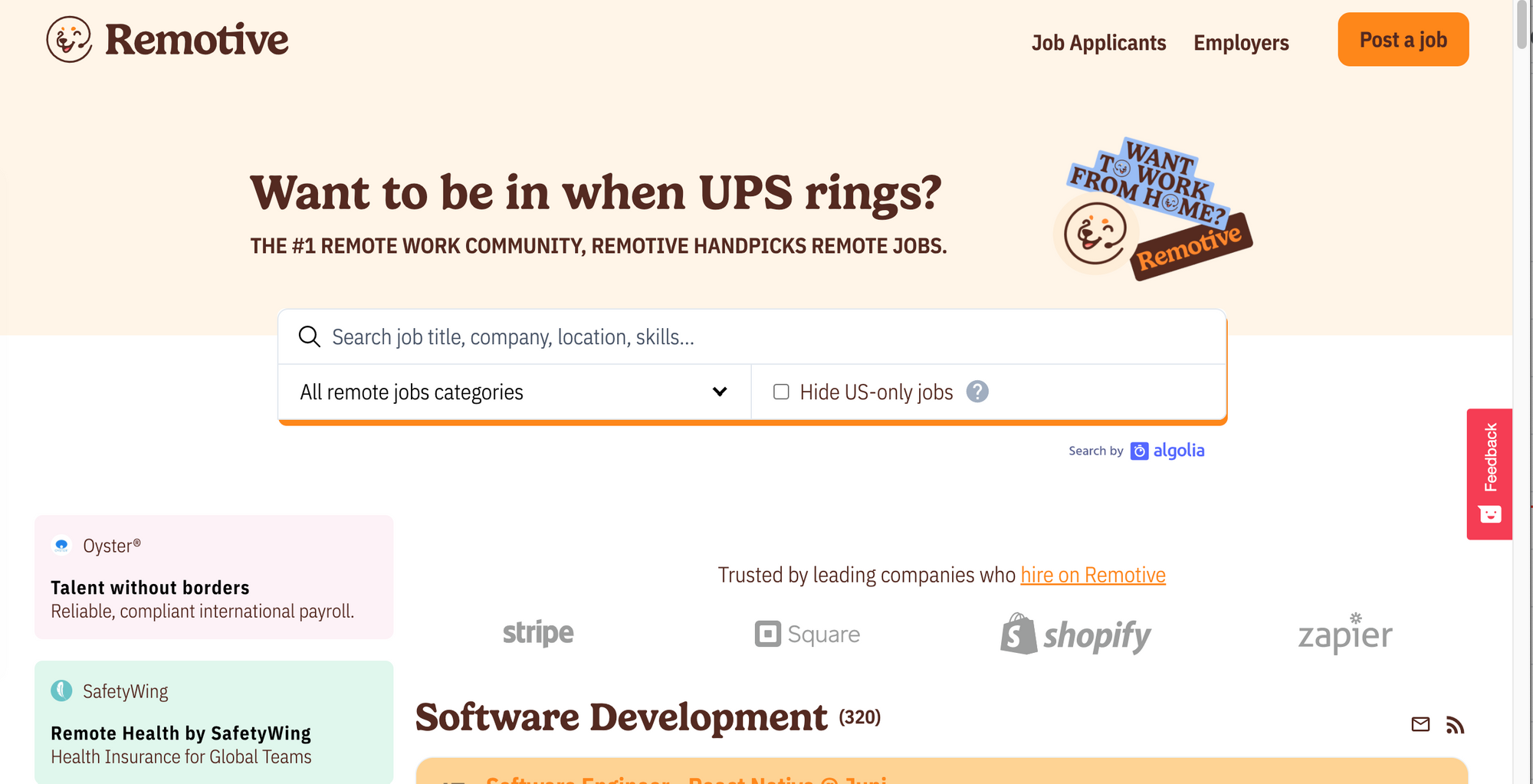
On Remotive there are a variety of different remote tech roles available.
There are listings for developer roles, customer support, customer service, sales, management, product design, product management, and more.
This job board is also focused on tech and there are filters available where you can view the different job categories available.
A new feature of theirs is the ability to hide the jobs that require applicants to be US-based and work remotely from a US timezone.
You can also use keywords, such as a specific skill or job title, to filter through all the different posts.
It also has a mailing list where you can receive daily job updates.
AngelList
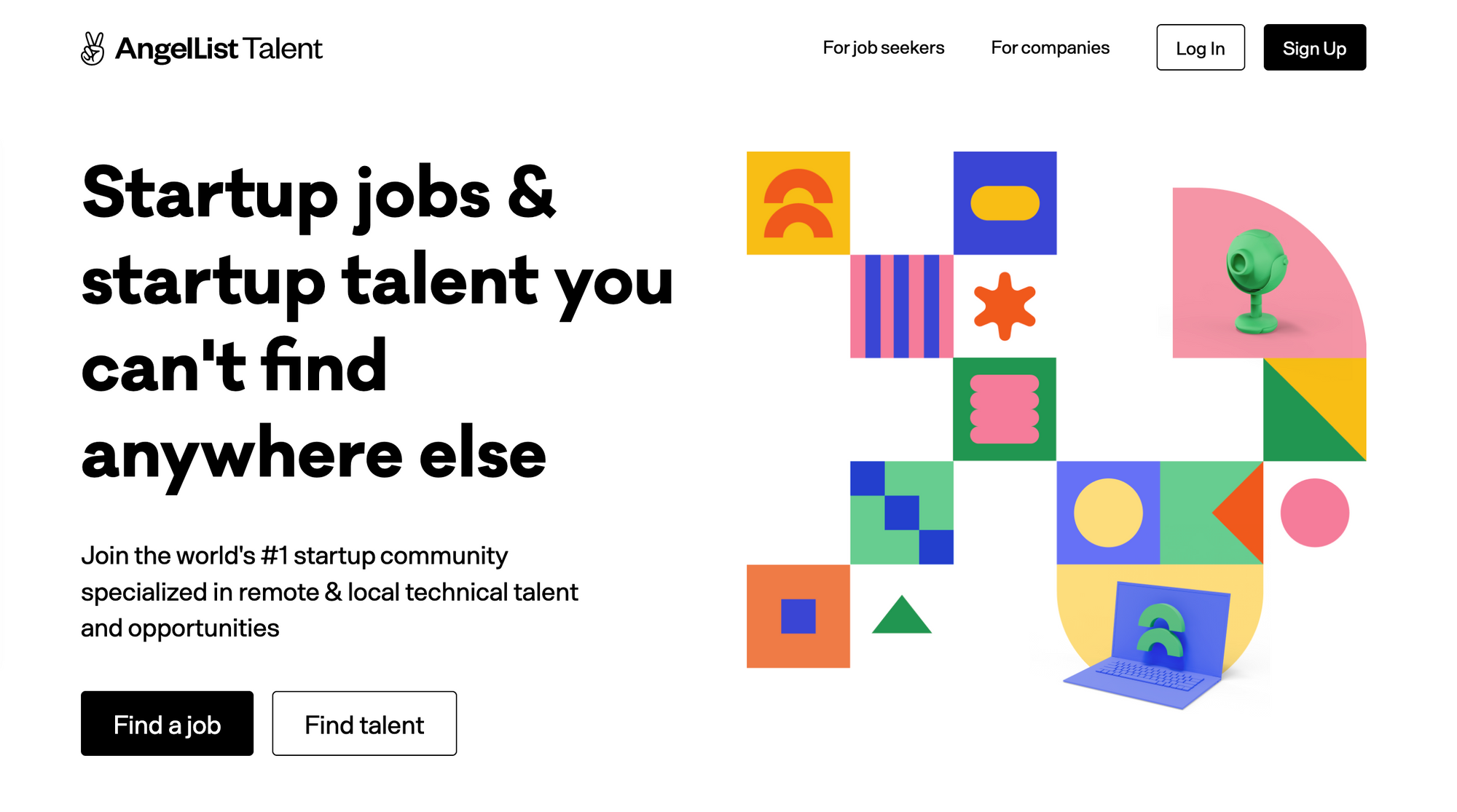
AngelList lists mostly tech startup jobs.
There, you can create your own profile where you'll be able to inlcude your skills and information about yourself.
You can also set your desired salary and the kind of culture you want a company to have.
Then, once your profile is set up you'll be able to apply to jobs directly from AngelList, without being redirected to the company's website.
Companies will be able to connect you with by finding you through your profile and contacting you.
There are advanced search filters, to filter through the different jobs available.
When browsing though jobs on AngelList, you can also view the salary and stock options of jobs.
Stack Overflow

Stack Overflow Remote Developer Jobs lists only developer roles that are done remotely.
It includes an advanced filter that helps you really tailor your search to best fit your needs and what you are looking for.
Here are some examples of what is available with the advanced filter:
- You can include up to ten tags of technologies you like working with and ten technologies you dislike working with.
- You can include companies you like and companies you want to avoid and exclude from your job search.
- You can include a minimum salary range you're expecting to get.
- You can enter your level of seniority and experience.
- You can select wether you require a visa sponsorship and want to relocate to a different country.
- Also, you can select what job type you're looking for, whether it's contract work, a full time position, or an internship.
You don't need to create a profile. When you apply for a position, you'll be redirected to the company's website.
LinkedIn Jobs
On LinkedIn you get to create your own profile where you include your work history, highlight your skills, and write a headline that summarizes your achievements and past job experiences.
A good way to stand out is to share any articles you've written, and share other interesting and informative content.
LinkedIn is a way to connect directly with companies by reaching out to recruiters.
You can also let recruiters know you are available for hire. Specifially, you can inform them on what kind of postion you're looking for and whether you prefer to work remotely.
This is a feature you can add to your profile but it's private and is only visible to them.
Often if your profile is impressive, recruiters will reach out to you and direct message you.
Here are some resources for you to create a stand-out LinkedIn profile:
- How To Build An Amazing LinkedIn Profile 15+ Proven Tips
- How to Use LinkedIn to Get Your First Developer Job – A Step-by-Step Guide
Conclusion
The work landscape is starting to change and remote work is increasing in popularity and demand.
In this article, you saw some ways to stand out to remote companies as an early career developer.
You also saw some of the most popular job boards that feature remote-friendly companies.
Thanks for reading and good luck with your remote job search!

